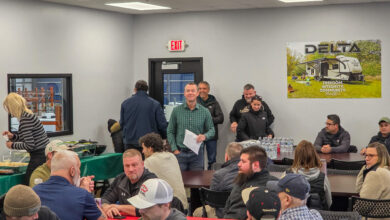China Rises to World’s Fourth Biggest RV Market Amid ‘Personalized Tourism’
The following is a report from YiCai Global.
China has emerged as the world’s fourth-largest market for recreational vehicles, after Australia, the European Union and North America. This growth is driven by the rising popularity of unique travel experiences, with glamping, or glamorous camping, becoming a significant trend.
Some 14,365 RVs were sold in China last year, according to the latest data.
“China’s RV industry is developing quickly as RV culture becomes more popular and consumer demand for personalized tourism grows,” Gao Wei, boss of a RV assembling company based in eastern Zhejiang province, told Yicai. “And it will also usher in broader development prospects.”
“To many people RVs are still a luxury and are out of reach,” Gao said. “But actually, there are quite a few affordable RVs on the market in China now.”
Priced at around CNY300,000 (USD42,135) each, Class C RVs, which come equipped with beds, ovens, refrigerators, sofas, bathrooms, televisions and stereo equipment, are the best-selling mobile homes on the Chinese market at present, Gao said. Class B RVs are cheaper at CNY200,000 each, and caravans with lower specifications cost even less.
But a lack of suitable campsites in China is holding back the development of the country’s RV market. Even Guangdong, the province with the most RV sales, only has around 20 decent campsites, which is not enough to meet the demand of RV travelers both in terms of numbers and quality.
In China, hefty land use prices and strict land use policies restrict the development of RV campsites, industry insiders told Yicai. On top of the land rentals, it is expensive to build supporting facilities for water and power as well as sewage treatment. Catering costs are also high. And early on, most RV campsites found it hard to make money due to the low occupancy rate, they said.
A lack of campsite facilities restricts the growth of the RV market. In some countries where RVs are popular, the campsites are classed as utilities and the fees to build electricity and water infrastructure is included in the budget for parking lots’ public equipment construction.
“A good campsite should have a beautiful landscape as well as plenty of supporting facilities such as malls, restaurants and shops,” Gao said. “Such facilities not only meet tourists’ basic needs but also provide plenty of activities, so that tourists enjoy their journey more.”
“I will go to Europe and the Middle East to attend some industry shows soon,” Gao said. “I want to see what market opportunities there are abroad and to learn from the experiences of successful overseas competitors. As an industry insider, I want to make an effort to enable more people to experience the joy of RV travel through my products and services,” he said.
Read the full report from YiCai Global here.
